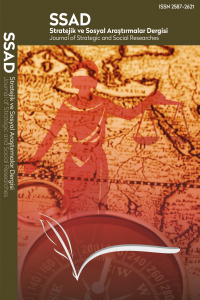TÜRK-YUNAN İLİŞKİLERİNDE DÖNÜM NOKTASI: BİRİNCİ DÜNYA SAVAŞI ARİFESİNDE OSMANLI DEVLETİ İLE YUNANİSTAN’IN “NORMALLEŞME” ARAYIŞI VE ALMANYA’NIN İTTİFAK PROJESİ
Birinci Dünya Savaşı’na giden süreçte Osmanlı Devleti ve Yunanistan’ın ilişkilerindeki kriz halini sonlandırarak ittifak kurma girişimlerini mercek altına alan bu çalışmanın amacı, Almanya’nın bu arayışa katkısının ne olduğunu ortaya koymak ve ittifakın gerçekleştirilmesinin mümkün olup olmadığını sorusuna yanıt bulmaktır. Balkan Savaşları sonrasında Osmanlı-Yunan ilişkilerinde normalleşmenin sağlanamaması, bölgedeki savaş halini sonlandıramadığından Avrupa barışını tehdit eden bir durum arz etmekteydi. İki ülke arasındaki uzlaşmazlığın temel nedeni Birinci Balkan Savaşı sırasında Yunanistan tarafından işgal edilen ve yapılan tüm anlaşmalara rağmen statüsü belirlenemeyen ve nihai kararın Büyük Güçlere bırakıldığı Ege Adaları meselesiydi. Osmanlı Devleti Batı Anadolu’nun güvenliği için hayati önem arz ettiğini öne sürdüğü bazı adaların (özellikle Sakız ile Midilli) iadesini talep ederken Yunanistan’ın buna yanaşmaması iki ülkeyi yeni bir savaşın eşiğine getirmişti. Büyük Güçler genel olarak bu durumun yeni bir Balkan Savaşı’na zemin hazırladığına ve en nihayetinde de Avrupa’yı genel bir savaşa götürme potansiyeline sahip olduğuna inanırken Almanya gerginliğin sonlandırılması için en fazla çaba sarf eden devlet olmuştu. Almanya’nın bu yaklaşımının ardında yatan neden, oluşturacağı ittifak yoluyla iki ülkeyi kendi bloğuna dâhil etmek ve İtilaf bloğuna karşı avantaj elde etmekti. Ağırlıklı olarak ilgili ülkelerin arşiv kaynaklarına dayanan ve tarafların olaylara yaklaşımını karşılaştırmalı analiz yöntemiyle ele alan bu çalışmanın vardığı sonuç, Batı Anadolu’ya yönelik yayılmacı emelleri olan Yunanistan’ın çekimser tutumu nedeniyle iki ülke arasında bir ittifakın imkânsız olduğu, Almanya’nın tüm girişimlerine rağmen bunu mümkün kılamadığı yönündedir. Çalışma, savaş öncesinde iki ülke arasındaki ilişkilerde kurulacak bir ittifak yoluyla normalleşmenin imkan dâhilinde olduğunu, İttihatçıların bu uğurda adalardan vazgeçmeye bile razı geldiğini ancak Yunanistan’ın olumsuz tutumu nedeniyle tarihi bir fırsatın kaçırıldığını ortaya koyması bakımından önem arz etmektedir.
Anahtar Kelimeler:
Osmanlı Devleti, Yunanistan, Almanya, İttifak, Ege Adaları
The Turning Point in Turkish-Greek Relations: Search for "Normalization" of the Ottoman Empire and Greece on the eve of the First World War and Germany's Alliance Project
This study is about the Greek-Turkish attempts to form an alliance by normalizing their relations leading up to the First World War. The aim of the study is to reveal what the contribution of Germany to this search and to find an answer whether it was possible or not. The ongoing crisis in the Greek-Turkish relations after the Balkan Wars was threatening the peace in Europe because it could not end the state of war in the region. The bone of contention between the two countries was the Aegean Islands which was occupied by Greece during the First Balkan War and whose status could not be determined despite all the agreements made and where the final decision was left to the Great Powers. While the Ottoman Empire asked some of the islands (especially Chios and Lesbos) be returned because they were vital for the security of Western Anatolia, Greece opposed it and the two countries came to the brink of war. The Great Powers tried to ease the crisis for they believed that this could pave the way for a new Balkan War and ultimately lead Europe to a general war. Germany was the state that made the most effort to end the tension between the parties. The main reason behind this was to include the two countries in its own bloc through the alliance and gain advantage against the Entente bloc. The work is mainly based on the archival sources of the relevant countries and used comparative analysis method when examining the view of the parties. The study concludes that an alliance between the two countries was not possible because of Greece’s negative attitude and German attempts failed to change this attitude. The study shows that normalization of the relations through an alliance was possible, that the Unionists were even willing to give up the islands for the sake of alliance, but a historical opportunity was missed due to Greece's negative attitude.
Keywords:
Ottoman Empire, Alliance, Greece, Turkey, Germany,
___
- Abbott, George Frederik Greece and the Allies, 1914-1922, Methuen & Co Ltd, London, 1922 Ahmad, Feroz, “Osmanlı İmparatorluğu’nun Sonu”, Osmanlı İmparatorluğu’nun Sonu ve Büyük Güçler, ed. Marian Kent, çev: Ahmet Fethi, Tarih Vakfı Yurt Yayınları, İstanbul, 1999.
- ISSN: 2587-2621
- Yayın Aralığı: Yılda 3 Sayı
- Başlangıç: 2017
- Yayıncı: Mehmet Ali KARAMAN
Sayıdaki Diğer Makaleler
NÜFUS MÜBADELESİ VE BATI TRAKYA TÜRKLERİ
TÜRK-YUNAN İLİŞKİLERİNİN AZINLIKLARA YANSIMASI (1923-1991)
ONTOLOJİK GÜVENLİK BAĞLAMINDA TÜRK[İYE]-YUNAN[İSTAN] ÇATIŞMASI
GÜNÜMÜZ YUNANİSTAN’INDA MÜSLÜMAN KARŞITI NEFRET VE AYRIMCILIĞI YENİDEN DÜŞÜNMEK
KOLEKTİF HAFIZANIN DERİN DEHLİZ MABEDİ: AYASOFYA
